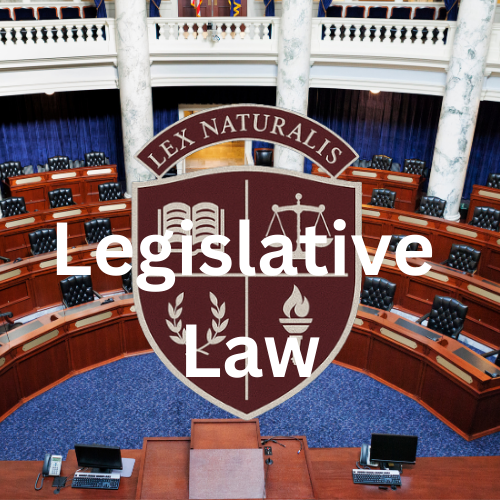The Will of the People vs. The Rule of Law
- Dr. Byron Gillory
- Sep 6
- 4 min read

I. The Popular Error
It is a maxim often repeated in our age, though seldom well understood, that “the voice of the people is the voice of God.” Yet this adage, so pleasing to the ear of the demagogue, hath been the ruin of many a commonwealth. For the people, though sovereign in authority, are not infallible in judgment; their will, unguided by principle, is as the sea—restless, unstable, driven by every wind.
Law, by contrast, is meant to be the anchor of society: fixed, rational, grounded in enduring principles rather than passing passions. The mistake of our time is to exalt mere will above law, and to suppose that whatever the majority desire must needs be just. In truth, the history of free peoples is a warning that unbridled will, when clothed with power, soon devoureth liberty.
II. The Rule of Law: Order Grounded in Reason
The rule of law is not the supremacy of statute alone, nor the authority of magistrates unchecked, but the reign of reason embodied in settled principles, impartially applied. Blackstone himself described law as “a rule of action prescribed by the supreme power in a state.” Yet this rule is not the arbitrary decree of the moment, but the application of justice consonant with the eternal law of God and nature.
Thus the rule of law requireth:
Generality, that all be bound alike.
Stability, that men may order their affairs in confidence.
Clarity, that none be ensnared by obscurity.
Constraint, that rulers themselves be governed by the laws they enact.
In all these respects, the rule of law standeth opposed to the bare will of the people, which is often particular, sudden, obscure, and unbounded.
III. The Danger of Populist Will
History doth abound with examples of the perils that arise when will is mistaken for law. The Athenian democracy, swayed by the passions of the mob, condemned Socrates, not by principle, but by caprice. The Roman republic, surrendering to popular appetites, destroyed its own constitutional balance and gave birth to the empire.
Nearer to our own age, we have witnessed legislatures pass statutes in the heat of crisis, more to appease clamor than to preserve justice—only to repent when confusion, litigation, and tyranny ensued. For when statutes are framed to flatter the multitude rather than conform to principle, they become snares to liberty, weapons for faction, and instruments of oppression.
Populist will may for a season appear triumphant, but like fire uncontrolled it soon consumeth the house of freedom.
IV. Legislative Law: Reasoned Order in Practice
Herein is the purpose of Legislative Law: to elevate statute above the shifting winds of opinion, and to ensure that what is enacted be not merely desired, but just. Legislative Law requireth that statutes be tested against reason, the constitution, and the enduring principles of liberty.
The Legislative Jurist, or Counselor, is therefore not a servant of passion, but of order. His charge is to guide legislators:
away from rash enactments, toward durable design;
away from factional interest, toward the common good;
away from mere will, toward consonance with law in its truest sense.
Legislative Law is thus the guardian of the rule of law against the encroachments of populism. It converteth desire into deliberation, will into wisdom, and power into order.
V. Blackstone’s Guidance
Sir William Blackstone never confounded will with law. He taught that law is valid only insofar as it is consistent with natural right and the constitution of the realm. The legislature, he observed, is supreme in making statutes, yet even Parliament is not free to command what is manifestly unjust; for “no human laws are of any validity if contrary to the law of nature.”
This truth our age must recover. Popular will, though sovereign in source, is bound to rule itself by reason. The people may choose their representatives; but those representatives must legislate, not to gratify every appetite, but to frame statutes that endure, harmonize, and protect.
VI. Gillory & Associates: A Vanguard of Ordered Law
In this struggle between will and law, Gillory & Associates hath assumed a singular vocation. We stand as pioneers of Legislative Law, training and equipping a new profession of counselors who labor not to fan the passions of the multitude, but to temper them with reason. Through the Blackwell Institute for Legal Studies, through white papers, drafts, and counsel, we demonstrate that lawmaking must be a science as well as an art, guided by principle and not by mere power.
We affirm: true representation is not servility to the crowd, but stewardship for the ages. The statute-book must not be a diary of passions, but a code of justice.
VII. Conclusion: Liberty Preserved by Law, Not Will
Let it be remembered: liberty doth not flourish where the will of the people is unbounded, but where the rule of law is supreme. The people may be sovereign, yet their sovereignty is preserved only when exercised through law framed by reason, ordered by principle, and restrained by justice.
The task of Legislative Law is therefore nothing less than the salvation of constitutional government itself. For it transforms the will of the people into statutes that embody justice, clarity, and durability; and it ensures that freedom be not the toy of passion, but the heritage of a people governed by reason under law.
Therefore, we proclaim: The will of the people is the source of authority; the rule of law is the condition of liberty. To mistake the one for the other is tyranny; to unite them rightly is the genius of legislative law.
Comments